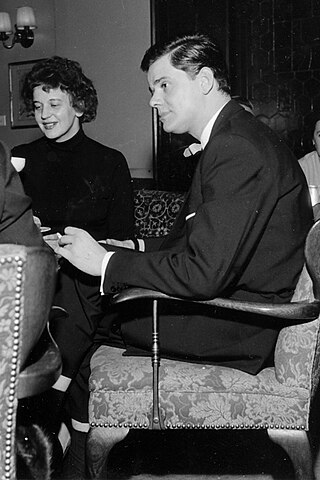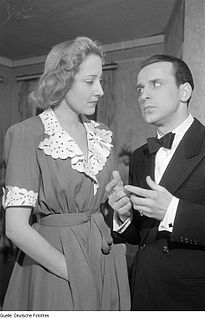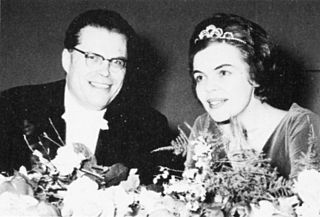
The Mozart Medal of the Mozartgemeinde Wien was a music award named after Wolfgang Amadeus Mozart.

The Mozart Medal of the Mozartgemeinde Wien was a music award named after Wolfgang Amadeus Mozart.
Fritz Pregl Prize has been awarded annually since 1931 to an Austrian scientist for distinguished achievements in chemistry by the Austrian Academy of Sciences from the funds left at its disposal by the Nobel prize-winning chemist Fritz Pregl.

The Vienna State Opera is an opera house and opera company based in Vienna, Austria. The 1,709-seat Renaissance Revival venue was the first major building on the Vienna Ring Road. It was built from 1861 to 1869 following plans by August Sicard von Sicardsburg and Eduard van der Nüll, and designs by Josef Hlávka. The opera house was inaugurated as the "Vienna Court Opera" in the presence of Emperor Franz Joseph I and Empress Elisabeth of Austria. It became known by its current name after the establishment of the First Austrian Republic in 1921. The Vienna State Opera is the successor of the Vienna Court Opera, the original construction site chosen and paid for by Emperor Franz Joseph in 1861.

Kestner Gesellschaft is an art institution in Hanover, Germany, founded in 1916 to promote the arts. Its founders included the painter Wilhelm von Debschitz (1871–1948). The association blossomed under the management of Alexander Dorner and Justus Bier, pioneering modern art.

Nadja Tiller is an Austrian actress. She was one of the most popular German-speaking actresses of international films of the 1950s and 1960s.

The Austrian Basketball Bundesliga was the top men's professional basketball league in Austria. Until the 2004–05 season, the league was known as the A-Liga (A-League) and then until the 2008–09 season it was called the Österreichische Basketball Bundesliga (ÖBL). From 2008 to 2019, it was named the Admiral Basketball League, after the league's main sponsor, Admiral Sportwetten.

Walter Giller was a German actor. He was very successful in the 1950s and 1960s, when he was often seen as a comedic leading man. One of his most successful and more serious roles was in Roses for the Prosecutor.
The Mozartinterpretationspreis was a music award named after Wolfgang Amadeus Mozart, administered by the Mozartgemeinde Wien and sponsored by the Austrian Ministry of Education and Culture. It was awarded from 1963 to 1998.

General der Panzertruppe was a General of the branch OF8 rank of the German Army, introduced in 1935. A General der Panzertruppe was a Lieutenant General, above Major General (Generalleutnant), commanding a Panzer corps.
Paul Esser was a German stage and television actor and voice actor. He is remembered for playing the lead role in the Sender Freies Berlin version of the detective series Tatort. Esser was born in Geldern-Kapellen and died in Tenerife.

Georg Thomalla was a German actor. He appeared in about one hundred fifty film and television productions between 1939 and 2000 and was widely known in Germany for his comedic roles.
Goethe-Plakette is the highest award by the Hessian Ministry for Science and the Arts of the federal state of Hesse, Germany, named after Johann Wolfgang von Goethe. It has been awarded since 1949 at irregular intervals. The award is given to individuals who have contributed to arts and culture in a special way and have been influential in the cultural development of the state of Hesse.
The Karl Renner Prize, established on the occasion of the Austrian Federal President Karl Renner’s 80th birthday by the city of Vienna, is awarded to individuals or groups in recognition of merits for Vienna and Austria in cultural, social as well as economical concerns, acknowledged on a national or international level. Endowed with 43,600 euro, the prize is currently given to a maximum of six nominees every three years.
Preis der Stadt Wien für Geisteswissenschaften or Prize of the City of Vienna for the Humanities is a prize awarded by the city of Vienna, Austria, awarded annually since 1947 for outstanding contributions in the humanities. It is worth 10,000 Euros to the winner.

Universities Austria is an advocacy organisation that supports research universities in Austria and promotes science, art, and research. It was founded in 1911. In 2008, it changed its name from Österreichische Rektorenkonferenz to Österreichische Universitätenkonferenz.

Erik Werba was an Austrian classical pianist who is especially known as an accompanist of singers. He was also a music critic, conductor, composer, author and academic teacher.
Gösta Neuwirth is an Austrian musicologist, composer and academic teacher. He studied in Vienna and Berlin, where he wrote a dissertation on harmony in Franz Schreker's Der ferne Klang. He has taught at universities and music schools including the Musikhochschule Graz, University of Graz, Universität der Künste Berlin and University of Freiburg. His compositions include a string quartet and a chamber opera.
Erich Marckhl was an Austrian musicologist and composer.
The Outstanding Artist Award for Music is given annually by the Federal Chancellery of Austria for achievements that influence the current art scene. Creative people are honored who can already show a meaningful oeuvre and whose works are of artistic supraregional importance. The prize is endowed with €10,000. The award winners are selected by an independent expert jury. The prize is awarded as a category of the Outstanding Artist Awards. In total, the Outstanding Artists Awards are given in 14 categories. The predecessor award State Prize for Music was given from 1950 to 1970. In 2009, the award was named Outstanding Artist Award for Music.